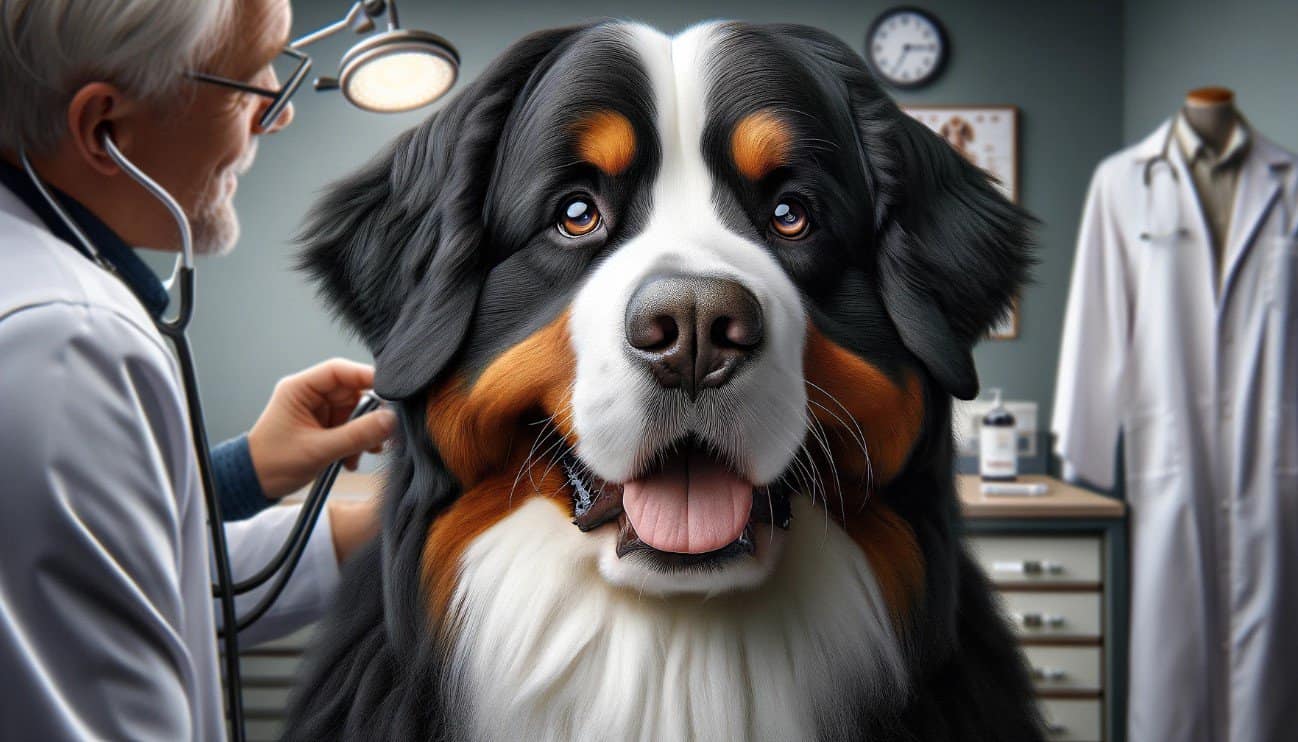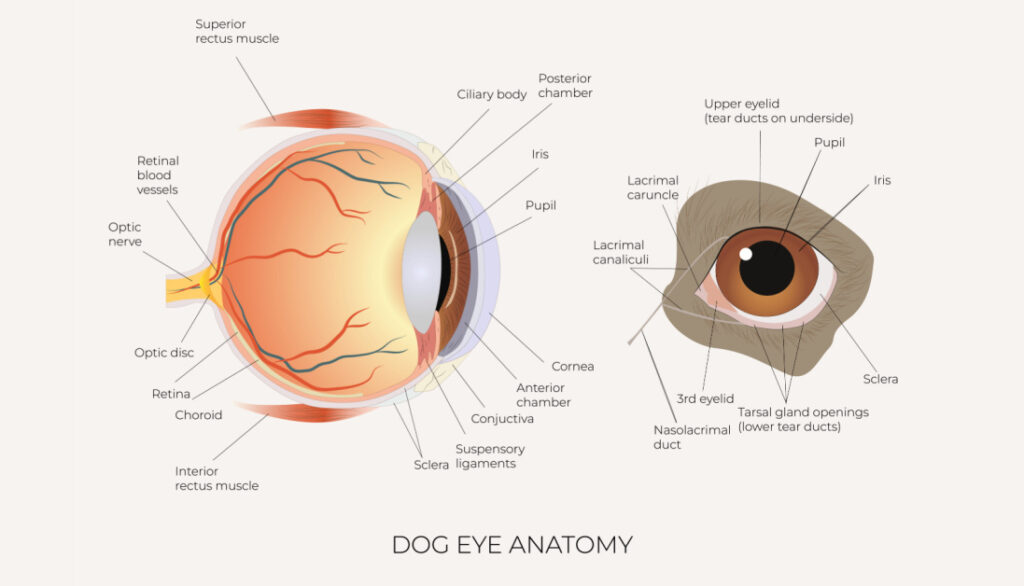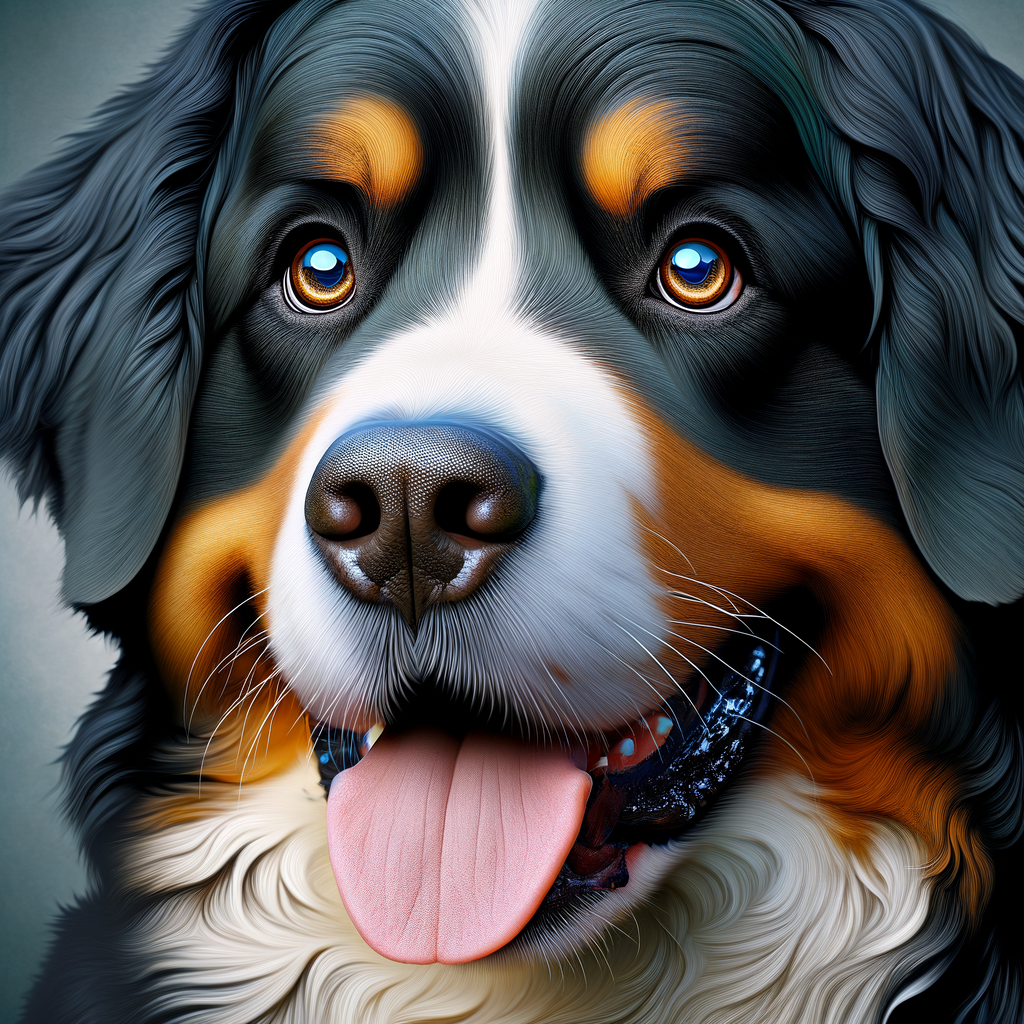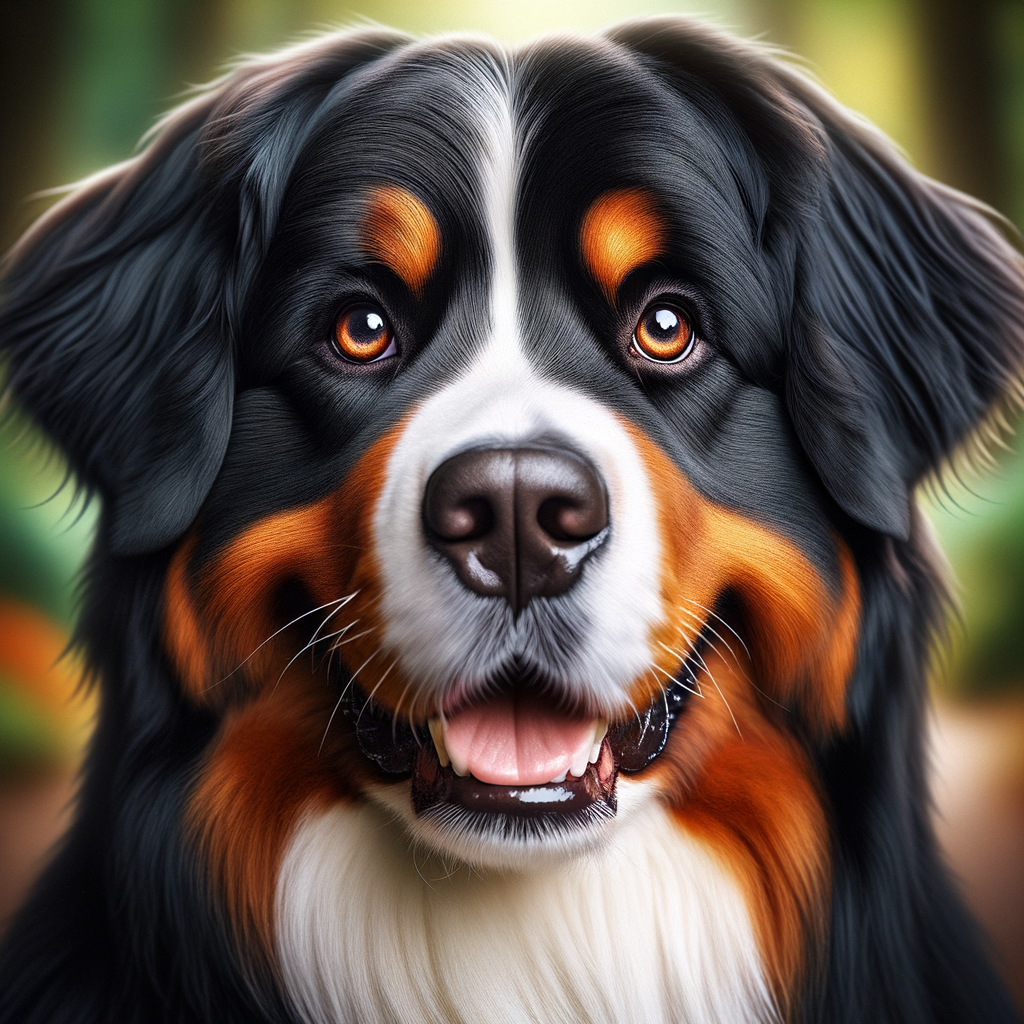Hey there, fellow Bernese Mountain Dog parent! I’m Dr. Candy Akers, a holistic veterinarian with a passion for pet health. Today, we’re going to chat about a topic that’s near and dear to my heart – Bernese Mountain Dog Eye Health.
Our lovable Bernese Mountain Dogs are known for their friendly nature and striking appearance. But, did you know that they’re also susceptible to specific eye health issues? It’s true! Understanding these conditions and knowing how to prevent them is crucial for ensuring our furry friends live a long, healthy, and happy life.

We’ll explore the unique eye structure of the Bernese Mountain Dog, common eye problems they may face, and preventative measures you can take. From dietary changes to environmental hygiene and routine care, we’ll cover it all. And remember, early detection is key in treating Bernese Mountain Dog Eye Conditions, so regular check-ups with your vet are essential.
Whether you’re a seasoned Bernese Mountain Dog owner or new to the breed, this information is important. So, let’s dive in and learn more about Bernese Mountain Dog Eye Health!
Understanding Breed Specific Eye Structure
When it comes to the health of your Bernese Mountain Dog, understanding their unique eye structure is pivotal. This knowledge can help you spot any potential problems early on and get the appropriate treatment promptly, thus ensuring the well-being of your furry friend.
Bernese Mountain Dogs, like other breeds, have a set of eyes that are distinct and adapted to their needs. These dogs have large, expressive eyes that are dark brown in color, set wide apart, and have naturally well-fitted eyelids. This breed-specific eye structure plays a significant role in their overall health and susceptibility to certain eye conditions.
One of the unique features of Bernese Mountain Dogs’ eyes is their deep-set nature. This characteristic, while contributing to their endearing appearance, can make them prone to certain eye diseases. For instance, the deep-set eyes can sometimes lead to entropion, a condition where the eyelid rolls inward, causing the eyelashes to rub against the eye surface. This can result in pain, corneal ulcers, or even vision loss if left untreated.
Another aspect of the Bernese Mountain Dog’s eye structure is the presence of a third eyelid, also known as the nictitating membrane. This thin, protective layer helps keep the eye moist and protects it from debris. However, it can also be a site for the development of eye conditions like cherry eye, where the gland in the third eyelid becomes inflamed and visible.
Additionally, the large size of the Bernese Mountain Dog’s eyes makes them vulnerable to eye injuries. They are more exposed and can easily come into contact with foreign objects leading to scratches, punctures, or other types of trauma.
Understanding these breed-specific eye structural traits can help you take proactive steps towards maintaining your Bernese Mountain Dog’s eye health. It also enables you to be more observant of any changes in your dog’s eyes, thus ensuring early detection and treatment of potential issues.

Common Eye Issues In Bernese Mountain Dog
As a veterinarian, I’ve had the opportunity to treat many Bernese Mountain Dogs and one common issue I often encounter pertains to their eye health. Understanding these concerns can help you as a dog parent to better care for your furry friend.
One common condition that affects Bernese Mountain Dog eye health is Progressive Retinal Atrophy (PRA). This is a group of genetic diseases that cause the retina to degenerate slowly over time, leading to blindness. Symptoms include night blindness and dilated pupils. It’s crucial to have your dog’s eyes checked regularly to detect PRA early and manage the progression.
Another common issue is Entropion, where the dog’s eyelid rolls inward. This can cause the eyelashes to rub against the cornea, leading to discomfort, redness, and potentially serious damage if left untreated. Surgery is often required to correct this condition.
Cataracts can also affect Bernese Mountain Dog eye health. This condition causes the lens of the eye to become cloudy, affecting vision. Cataracts can be managed with medication or removed surgically.
Other Common Eye Issues Include:
- Corneal Dystrophy: A condition that causes the cornea to become cloudy, affecting vision.
- Dry Eye: Also known as Keratoconjunctivitis Sicca (KCS), this condition occurs when the dog’s tear glands don’t produce enough tears, leading to dryness, irritation, and potential damage to the cornea.
- Glaucoma: This is a serious condition where increased pressure in the eye can lead to irreversible blindness if not treated promptly.
Remember, regular vet check-ups are crucial in maintaining your Bernese Mountain Dog’s eye health. Early detection and treatment can significantly improve the prognosis for many of these conditions. Always consult with your veterinarian if you notice any changes in your dog’s eyes, such as redness, cloudiness, or changes in behavior like bumping into things or being afraid of the dark.
As a dog parent, understanding these common eye issues can help you protect your Bernese Mountain Dog’s sight and ensure they lead a happy and healthy life.

Prevention of Eye Problems
Maintaining your Bernese Mountain Dog’s eye health is crucial to prevent eye diseases and conditions. There are two key aspects to consider: a holistic diet and nutritional supplements.
Holistic Diet – Inclusion of Natural Vitamin A & Antioxidants
Feeding your Bernese Mountain Dog a balanced and holistic diet can significantly contribute to their overall eye health. Foods rich in Vitamin A and antioxidants can help strengthen their immune system and reduce the risk of eye diseases.
- Vitamin A: This vitamin is essential for maintaining the health of the retina. Foods rich in Vitamin A include carrots, sweet potatoes, spinach, and kale.
- Antioxidants: Antioxidants can help protect your dog’s eyes from damage caused by free radicals. Foods rich in antioxidants include blueberries, cranberries, and pumpkins.
Remember, it’s always best to consult with your vet before making significant changes to your dog’s diet.
Whole-Food-Based Nutritional Supplements
In addition to a balanced diet, you might also consider adding whole-food-based nutritional supplements to your dog’s diet. These can provide additional nutrients that your dog may not get from their regular meals.
- Omega-3 Fatty Acids: These are essential for maintaining the health of your dog’s eyes. They can be found in fish oil supplements.
- Lutein and Zeaxanthin: These antioxidants are found in the retina and macula of the eyes. They can help protect your dog’s eyes from harmful light rays. They can be found in supplements derived from marigold flowers.
Again, it’s essential to consult with your vet before starting any new supplement regimen. They can guide you on the right dosage and frequency based on your dog’s specific needs.
By focusing on a holistic diet and incorporating whole-food-based nutritional supplements, you can help maintain your Bernese Mountain Dog’s eye health and potentially prevent common eye problems.
Environmental hygiene plays a crucial role in maintaining your Bernese Mountain Dog’s eye health. It’s essential to consider factors such as indoor air quality and the usage of sprays, diffusers, candles, and incense, as they can potentially irritate your dog’s eyes and lead to various eye problems.
Indoor Air Quality
Indoor air quality is often overlooked, but it’s a vital aspect of your dog’s overall health, especially their eye health. Poor indoor air quality can cause eye irritation, leading to conditions such as conjunctivitis or dry eye syndrome. Here are some tips to improve the air quality in your home:
- Regular Cleaning: Dust and pet dander can accumulate over time and cause eye irritation. Regular vacuuming and dusting can help keep these irritants at bay.
- Air Purifiers: These devices can help remove pollutants and allergens from the air, reducing the chances of eye irritation.
- Proper Ventilation: Ensure your home is well-ventilated to prevent the buildup of pollutants and maintain fresh air circulation.
Sprays, Diffusers, Candles, Incense
Products like sprays, diffusers, candles, and incense can add a pleasant aroma to your home, but they can also irritate your Bernese Mountain Dog’s eyes. If you notice your dog squinting, rubbing their eyes, or showing signs of discomfort after you’ve used these products, it might be best to avoid them.
- Sprays: If you must use sprays, do so in a different room from your dog, and make sure the area is well-ventilated.
- Diffusers: Essential oil diffusers can be harmful to dogs if they’re exposed to them for extended periods. It’s best to use them sparingly and in a separate area from your dog.
- Candles and Incense: These can release smoke and particles that can irritate your dog’s eyes. If you must use them, do so in a well-ventilated area and keep your dog at a safe distance.
Remember, your Bernese Mountain Dog’s eye health is influenced by many factors, including their environment. By maintaining a clean, healthy environment, you can help prevent eye problems and ensure your furry friend’s eyes stay bright and healthy.

Routine Bernese Mountain Dog Eye Care & Maintenance
As a loving Bernese Mountain Dog parent, one of the most important things you can do for your furry friend’s eye health is to establish a routine of daily and weekly care and maintenance. This not only helps to prevent Bernese Mountain Dog eye problems but also ensures early detection and treatment of any potential issues.
Daily & Weekly Care & Maintenance
Just like us, Bernese Mountain Dogs can benefit greatly from regular eye care. Start by examining your dog’s eyes every day. Look for any signs of redness, swelling, or discharge. If you notice anything unusual, it’s important to seek veterinary care immediately. Also, be sure to check for any changes in your dog’s vision.
Another important aspect of daily care is cleaning your dog’s eyes. Use a soft, damp cloth to gently wipe away any dirt or discharge. Always wipe from the inner corner of the eye outward, and use a different part of the cloth for each eye to avoid spreading any potential infection.
Weekly, you should also check your dog’s eyes in bright light to look for any cloudiness or changes in the color of the eye, which could be signs of Bernese Mountain Dog eye disease.
Monitor Hair Length, Nail Length, Bath Frequency
Other factors that can affect your Bernese Mountain Dog’s eye health include hair length, nail length, and bath frequency. Long hair can irritate your dog’s eyes, leading to redness, tearing, and potential infection. Regularly trimming the hair around your dog’s eyes can help prevent these problems. Similarly, long nails can lead to scratches on the eye, which can cause serious damage. Regular nail trims are a must for maintaining your dog’s eye health.
When it comes to baths, it’s important to keep soap and shampoo out of your dog’s eyes as they can cause irritation. Always use dog-friendly products and consider using a tearless shampoo to minimize the risk of eye irritation.
Remember, maintaining your Bernese Mountain Dog’s eye health requires regular care and attention. By incorporating these practices into your routine, you can help ensure that your furry friend’s eyes stay healthy and clear.
Remember: Routine care is essential for maintaining your Bernese Mountain Dog’s eye health. Regular check-ups, daily cleaning, and appropriate grooming can help prevent many common Bernese Mountain Dog eye conditions and ensure your furry friend’s eyes stay healthy and bright.
Frequently Asked Questions
1. What are common eye health conditions in Bernese Mountain Dogs?
Bernese Mountain Dogs are prone to several eye health conditions, including:
- Progressive Retinal Atrophy (PRA)
- Cataracts
- Entropion
- Ectropion
- Cherry Eye
2. How can I identify if my Bernese Mountain Dog has an eye health problem?
Watch out for the following signs that may indicate an eye health problem in your Bernese Mountain Dog:
- Redness or inflammation in the eye
- Excessive tearing or discharge
- Cloudiness or opacity in the eye
- Squinting or blinking excessively
- Visible changes in the eye structure
3. What should I do if I suspect my Bernese Mountain Dog has an eye health issue?
If you notice any signs of eye health problems in your Bernese Mountain Dog, it is important to consult a veterinarian as soon as possible. They will be able to perform a thorough examination and provide appropriate treatment or recommendations.
4. Can eye health conditions in Bernese Mountain Dogs be treated?
Many eye health conditions in Bernese Mountain Dogs can be treated, depending on the specific condition and its severity. Treatment options may include medication, surgery, or other interventions recommended by a veterinarian.
5. How can I prevent eye health problems in my Bernese Mountain Dog?
While not all eye health problems can be prevented, there are some measures you can take to promote good eye health in your Bernese Mountain Dog:
- Regularly clean your dog’s eyes to remove any debris or discharge
- Keep their face clean and free from excessive hair that may irritate the eyes
- Provide a balanced diet and ensure they receive proper nutrition
- Visit a veterinarian for routine eye examinations
- Avoid exposing your dog to environments or substances that may cause eye irritation or injury
